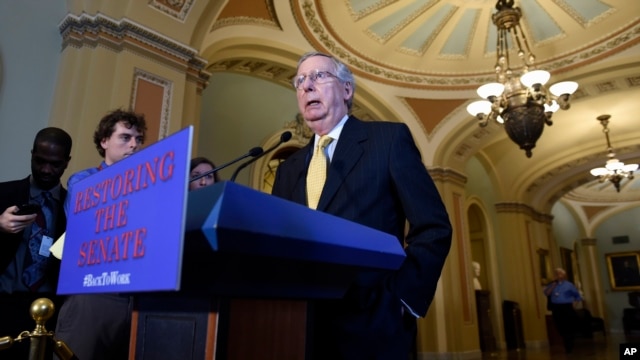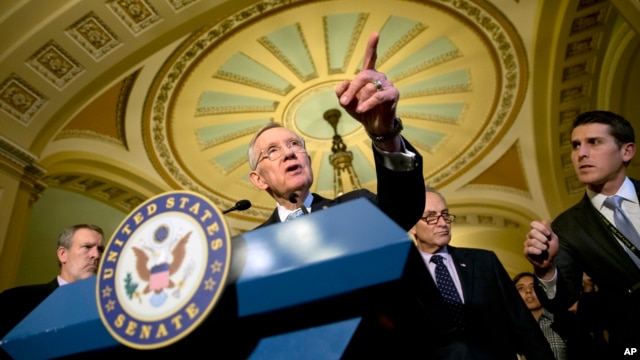
Washington’s Functionality to Be Tested in 2016
December 27, 2015
From funding the U.S. government to upgrading America’s overburdened highways to boosting the nation’s cyber security, the Republican-led Congress passed a flurry of bills that President Barack Obama, a Democrat, enthusiastically signed into law.
Seeking compromise
The Senate’s majority leader, Republican Mitch McConnell, took note in an end-of-year news conference.
“When the American people elect divided government, they are not saying ‘don’t do anything.’ They are saying, ‘look for the things you can agree on,’” McConnell said.
FILE – Senate Majority Leader Mitch McConnell of Kentucky speaks to reporters on Capitol Hill in Washington.
Democrats, who lost their Senate majority in 2014, claimed some of the credit.
“When Republicans were in the minority, their goal was obstruction,” said Democratic Senator Patty Murray. “Now that Democrats are in the minority, our goal is helping the middle class, and we are willing to work with Republicans to achieve that.”
For some Republican presidential contenders, a Washington that works is a Washington up to no good.
“If you see a candidate who Washington embraces, run and hide,” said Senator Ted Cruz at a recent campaign event in Alabama. “If you think Washington is fundamentally broken, that there is a bipartisan corruption of career politicians in both parties that get in bed with the lobbyists and special interests and grow and grow and grow Washington… that is what this campaign is all about!”
Return to old norms
Such barbs have not weakened the resolve of Republican congressional leaders.
“As Congress works in the new year, I want to make sure that we get back to what is called ‘regular order’ so that we have a system that operates like the founders intended,” Speaker Ryan said.
Ryan’s plan is getting a favorable initial reaction from Democrats.
“The speaker and I had a number of conversations,” said the Senate’s minority leader, Democrat Harry Reid. “He wants to do appropriation bills; I want to do appropriation bills. And there is no reason we can’t.”
FILE – Senate Minority Leader Harry Reid (at podium) speaks during a news conference on Capitol Hill in Washington.
Congress just passed a mammoth, catch-all federal spending bill, known as the Omnibus, that will keep the U.S. government funded through September 2016. Such bills have been the norm for the last two decades. Before then, congressional committees commonly passed individual spending bills that received separate floor votes in both chambers.
McConnell said a return to that practice would allow Congress to better fulfill its fiscal duties.
“This big bill we just passed was $1.1 trillion (of spending) in one bill. That’s not the way to do business. And so we are going to try our best not to end up in that situation again,” he said.
McConnell will need help from Democrats, who have designs of their own for next year.
“We can only hope that our Republican colleagues will be as cooperative a minority as we were this year when Democrats take back the Senate in 2016,” said Democratic Senator Chuck Schumer.
Republican leaders aim to keep that prediction from coming true, and see a functional Congress as key to that goal.



